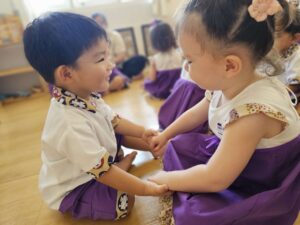From the moment a child steps into the classroom at House on the Hill, teachers take on a role far beyond that of a teacher—they become caregivers, mentors, and a guiding presence in a child’s everyday life. Parents place deep trust in teachers when they entrust their children to them each day. Spending much of their time at school, children naturally seek role models among those around them.
Our teachers at House on the Hill embrace this vital role with great care and dedication. They provide comfort during tough moments, offer encouraging words, celebrate small successes, and often become the reassuring presence a child needs when feeling homesick.
4 Beautiful Locations Islandwide
Teachers as Role Models: What They Teach our Children
Teachers play a critical role in shaping the future by educating and nurturing the next generation. Here are some key reasons why teachers are so important:
1. Guiding Academic and Intellectual Growth
- Love for Learning: By creating engaging and dynamic lessons, teachers spark a love for learning that can last a lifetime.
- Foundation of Knowledge: Teachers impart essential knowledge and skills, laying the foundation for students future learning and success.
- Critical Thinking: They encourage students to think critically, ask questions, and explore new ideas, fostering intellectual curiosity.
2. Serving as Role Models
Teachers play a pivotal role in shaping the values and character of children. As they interact with students daily, teachers impart crucial values like respect, kindness, and integrity. This process begins with the basics of communication and behaviour.
- Modeling Respect and Kindness: Teachers demonstrate respect and kindness through their actions and words. When they address students with consideration, listen actively, and treat each child with fairness, they model how to interact with others in a respectful and empathetic manner. Children learn that showing respect to others is not just a rule but a fundamental part of creating positive relationships.
- Communication Skills: Effective communication is at the heart of building respectful and kind interactions. Teachers teach children how to express their feelings, articulate their needs, and listen to others. By guiding students through discussions about how to communicate respectfully and resolve conflicts amicably, teachers equip them with the tools to navigate social situations with empathy and understanding.
- Fostering a Sense of Responsibility: Teachers also instil a sense of responsibility by setting clear expectations and holding students accountable for their actions. When students understand the importance of being responsible for their own behaviour and the impact it has on others, they develop a strong sense of integrity and ethical behaviour.
3. Fostering Emotional and Social Development
Teachers are instrumental not only in teaching academic subjects but also in helping children manage and understand their emotions, a vital aspect of emotional and social development.
- Teaching Emotional Regulation: Teachers introduce strategies for coping with stress, frustration, and anxiety, such as deep breathing, mindfulness, and positive self-talk. By teaching these techniques, teachers help children develop emotional resilience and self-regulation skills.
- Encouraging Empathy and Emotional Intelligence: Teachers encourage students to empathise with others and understand different perspectives. They help children identify and articulate their own emotions, as well as recognise and respond to the emotions of their peers. This focus on emotional intelligence enhances children’s ability to build meaningful relationships and navigate social interactions effectively.
- Supporting Emotional Growth: Teachers often act as a source of comfort and guidance during challenging times. Whether a child is experiencing personal difficulties or facing social challenges, teachers provide a listening ear and offer support. By being attentive and responsive to students emotional needs, teachers contribute significantly to their overall well-being and development.
4. They Create a Safe Space for a Child’s Growth
A safe space is an environment where individuals, particularly children, feel secure, respected, and supported. In the growing years of a child, creating a safe space is the key to unlocking their personality and building confidence.
- Encourages Open Expression: In safe spaces, children feel comfortable sharing their thoughts, feelings, and ideas without fear of ridicule. The openness allows them to engage more deeply in discussions, ask questions, and express their creativity. The freedom to communicate openly supports cognitive development and fosters confidence in their own abilities.
- Fosters a Sense of Belonging: Feeling a sense of belonging is crucial for children’s social and emotional development. It helps build a positive classroom community where students feel connected to their peers and valued by their teachers. This sense of belonging enhances motivation, engagement, and overall well-being.
- Facilitates Personal Growth: A safe space allows children to explore their identities and interests without fear of judgment. This exploration is key to personal growth, as it helps students discover their strengths, passions, and areas for improvement. Supportive feedback and encouragement from teachers further foster this growth, helping students build a positive self-image and self-efficacy.
5. Nurturing Lifelong Learners
- Love for Learning: By creating engaging and dynamic lessons, teachers spark a love for learning that can last a lifetime.
- Adaptability: They help students develop the skills needed to adapt to new challenges and environments, preparing them for the ever-changing world.
6. Influencing Future Success
- Career Guidance: Teachers help students discover their strengths and interests, guiding them toward future educational and career paths.
- Empowerment: By believing in their students’ potential, teachers empower them to achieve their dreams and make positive contributions to society.
Unseen Partnership with Parents
Parents and teachers are partners in a child’s growth. While parents provide the foundation at home, teachers build upon it each day. This partnership is built on communication, trust, and mutual respect. Teachers are often the ones who notice the small changes—a child who seems more withdrawn than usual or one who is suddenly bursting with excitement about a new interest. They share these insights with parents, creating a bridge between home and school that supports the child’s holistic development.
Teachers are more than just educators—they are the cornerstone of society, shaping the minds, hearts, and futures of the next generation. Their influence extends far beyond the classroom, impacting students’ lives in profound and lasting ways.








